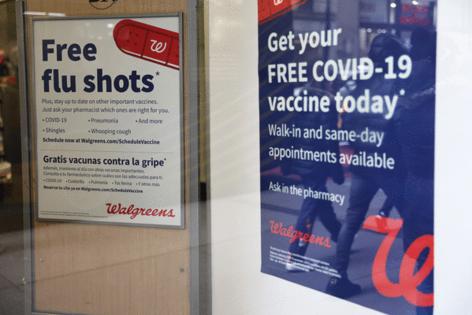Ask the Pediatrician: Which flu vaccine should children get?
Published in Health & Fitness
Many people don't realize how serious influenza (flu) illness can be, even for previously healthy kids and teens. Children also play a role in spreading the flu in their homes, schools and communities.
The 2024-25 flu season was more severe than usual. A record number of U.S. children were hospitalized with the flu, and more than 260 died. As a parent, the best thing you can do to protect your children and others from the flu is to get them vaccinated.
Influenza viruses change yearly. All children 6 months and older need a flu vaccine every year. Children should get their influenza vaccine when the doses become available, especially if they need two doses this season. That way they will be protected before flu starts circulating in their community. It takes about two weeks after the vaccine to build immunity and develop protection.
There are two types of influenza vaccines available. The first is what many people call the "flu shot." The second comes as a nasal spray.
All the vaccines available for children this year protect against three different influenza viruses (two A viruses and one B virus). During flu season, multiple different flu viruses may circulate. Sometimes the viruses change during the flu season.
The American Academy of Pediatrics wants as many children as possible to get a flu vaccine every year.
Any licensed influenza vaccine available this year (flu shot or nasal spray) and appropriate for a child's age and health status can be given, with no preferred product or formulation. Influenza vaccination should not be delayed to get a specific product, including a thimerosal-free product.
Each year, it is possible that flu, COVID-19 and other common viruses will spread at the same time. Sometimes, the vaccine is not an exact match with the strains in the community. But the vaccine still can protect against serious illness. Talk with your pediatrician about your child getting the flu vaccine along with other recommended immunizations. Flu vaccine can also be given at the same visit as the respiratory syncytial virus (RSV) immunization.
Children with COVID should get a flu vaccine after they have recovered from their COVID illness. Keep in mind that symptoms such as a stuffy and runny nose can make it hard to give the nasal spray vaccine.
A child who had an allergic reaction after a flu vaccine in the past should be seen by an allergist. The allergist can help parents decide if their child should receive their annual flu vaccination. A child with a known history of egg allergy can receive the flu vaccine without any additional precautions beyond those recommended for all vaccines.
Many pediatricians offer flu vaccine clinics, including curbside and drive-through clinics. The pediatrician's office has your child's health information. That makes it easy to keep track of the flu shot in your child's health record. This year, the flu nasal spray can be administered at home to some eligible children by a patient or caregiver.
If your child gets a flu vaccine somewhere else besides the pediatrician’s office, remember to share this information with the pediatrician so the vaccination is included in your child's health record.
Most people who get the flu are sick for at least a week. But some people get much sicker. Getting vaccinated is the best way to prevent influenza and the serious complications that can result from it—especially for those with high-risk conditions like asthma. For example, flu can lead to pneumonia. Kids with flu also can develop brain inflammation as well as febrile and non-febrile seizures.
The flu vaccine keeps people out of the hospital—it stops serious illness and deaths from influenza. The number of children who die from flu in a season has ranged from 1 child in 2020-2021 to 266 children in 2024-2025. This past season, 90% of pediatric flu-related deaths have been among children who were not fully vaccinated against influenza. Even children who are otherwise healthy and have no other medical conditions can be hospitalized with flu and develop life-threatening complications.
There's no need to wait, even if your child received the previous year's flu vaccine in March or April. Children 6 months to 8 years of age should receive two doses if this is the first time they are being vaccinated against influenza, or if they have only received one dose of flu vaccine ever before July 1. The doses are given four weeks apart. If your child is 8 years old and requires 2 doses of influenza vaccine, they should receive both doses even if they turn 9 years old between dose 1 and dose 2.
We have a vaccine for flu, unlike many other respiratory viruses that make kids sick. Let's protect our children from flu when we can.
____
Kristina A. Bryant, MD, FAAP, a pediatric infectious diseases specialist at the University of Louisville and Norton Children’s Hospital, is a member of the American Academy of Pediatrics Committee on Infectious Diseases, lead author of the annual AAP influenza policy statement and technical report, and lead for Red Book Online. She also is past president of the Pediatric Infectious Diseases Society.
©2025 Tribune Content Agency, LLC.










Comments